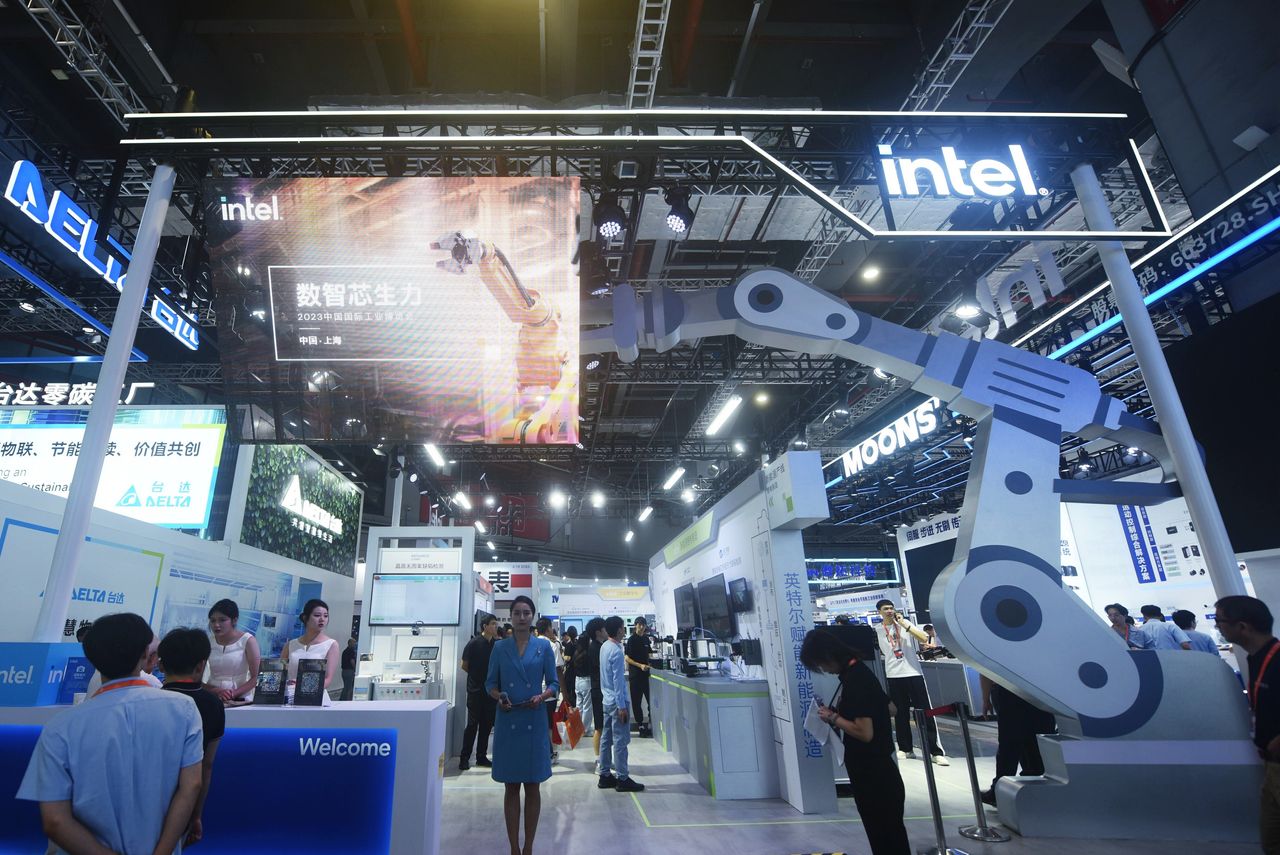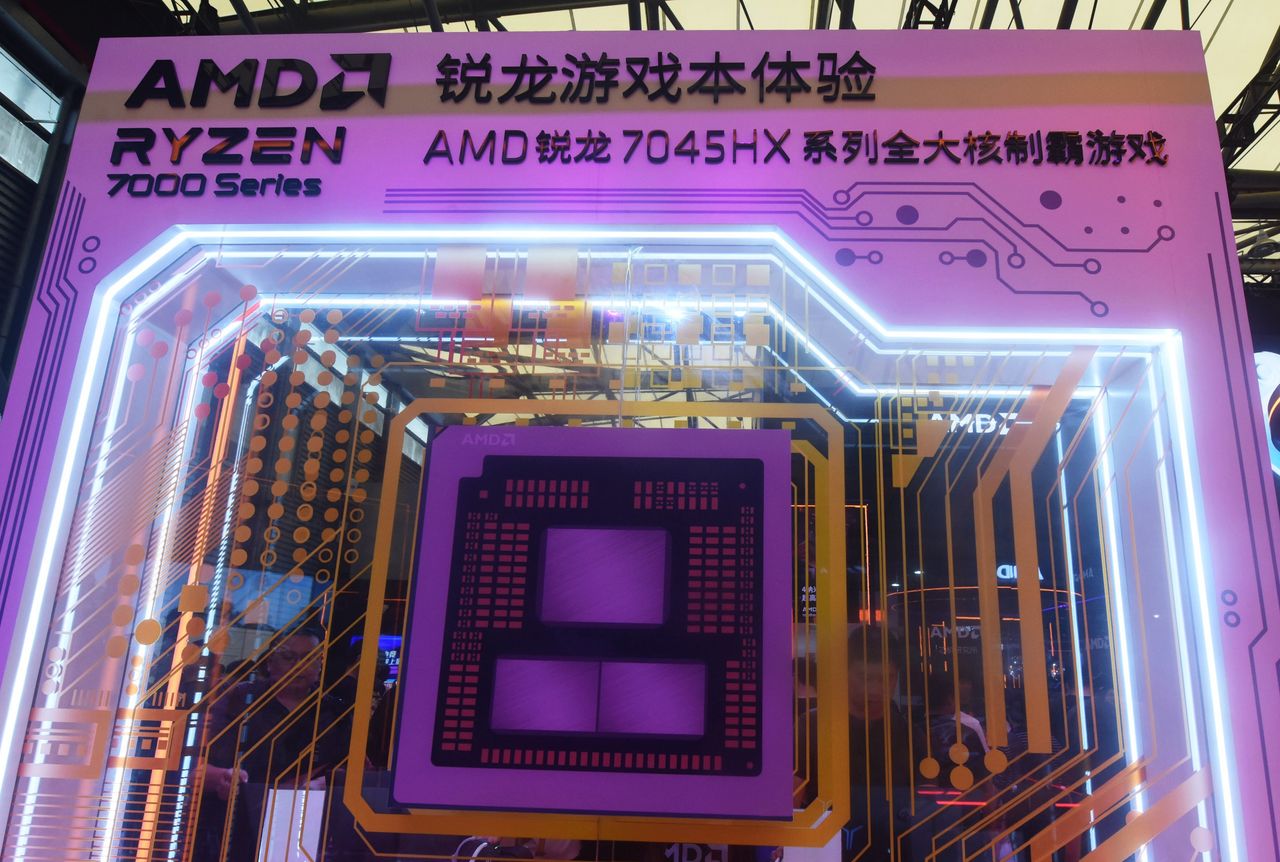
SINGAPORE—China’s push to replace foreign technology is now focused on cutting American chip makers out of the country’s telecom systems.
Officials earlier this year directed the nation’s largest telecom carriers to phase out foreign processors that are core to their networks by 2027, a move that would hit American chip giants Intel and Advanced Micro Devices, people familiar with the matter said.
The deadline given by China’s Ministry of Industry and Information Technology aims to accelerate efforts by Beijing to halt the use of such core chips in its telecom infrastructure. The regulator ordered state-owned mobile operators to inspect their networks for the prevalence of non-Chinese semiconductors and draft timelines to replace them, the people said.
In the past, efforts to get the industry to wean itself off foreign semiconductors have been hindered by the lack of good domestically made chips. Chinese telecom carriers’ procurements show they are switching more to domestic alternatives, a move made possible in part because local chips’ quality has improved and their performance has become more stable, the people said.
Such an effort will hit Intel and AMD the hardest, they said. The two chip makers have in recent years provided the bulk of the core processors used in networking equipment in China and the world.
Shares of Intel dropped 3.6% to $36.27 in early trading Friday while AMD fell 4.2% to $163.27.
China’s MIIT, which oversees the regulation of the wireless, broadcasting and communication industries, didn’t respond to a request for comment. China Mobile and China Telecom, the nation’s two biggest telecom carriers by revenue, also didn’t respond. Intel declined to comment. AMD didn’t respond to requests for comment.
Beijing’s desire to wean China off American chips where there are homemade alternatives is the latest installment of a U.S.-China technology war that is splintering the global landscape for network equipment, semiconductors and the internet. American lawmakers have banned Chinese telecom equipment over national-security concerns and have restricted U.S. chip companies including AMD and Nvidia from selling their high-end AI chips to China.
Chinese authorities have in turn been pushing for years to remove foreign suppliers from critical supply chains, seeking to source products from grains to semiconductors locally as national-security concerns rise. Similar orders requiring Chinese state-linked entities to shift their buying to local tech alternatives have resulted in U.S. software and hardware firms including Microsoft and Dell Technologies gradually losing their grip on the market, The Wall Street Journal has reported.
China has also published procurement guidelines discouraging government agencies and state-owned companies from purchasing laptops and desktop computers containing Intel and AMD chips. Requirements released in March give the Chinese entities eight options for central processing units, or CPUs, they can choose from. AMD and Intel were listed as the last two options, behind six homegrown CPUs.
Computers with the Chinese chips installed are preapproved for state buyers. Those powered by Intel and AMD chips require a security evaluation with a government agency, which hasn’t certified any foreign CPUs to date. Making chips for PCs is a significant source of sales for the two companies.
China Mobile and China Telecom are also key customers of both chip makers in China, buying thousands of servers for their data centers in the country’s mushrooming cloud-computing market. These servers are also critical to telecommunications equipment working with base stations and storing mobile subscribers’ data, often viewed as the “brains” of the network.
The two chip giants have the lion’s share of the overall global market for CPUs used in servers, according to data from industry researcher TrendForce. In 2024, Intel will likely hold 71% of the market, while AMD will have 23%, TrendForce estimates. The researcher doesn’t break out China data.
China’s localization policies could diminish Intel and AMD’s sales in the country, one of the most important markets for semiconductor firms. China is Intel’s largest market, accounting for 27% of the company’s revenue last year, Intel said in its latest annual report in January. The U.S. is its second-largest market. Its customers also include global electronics makers that manufacture in China.
In the report, Intel highlighted the geopolitical risk it faced from elevated U.S.-China tensions and China’s localization push. “We could face increased competition as a result of China’s programs to promote a domestic semiconductor industry and supply chains,” the report said.
Geopolitics already cloud the outlook for Intel and AMD’s China operations. Intel said in January that $3.2 billion, or 6% of their revenue in 2023, was dependent on U.S. government export control authorization, an amount the company expected may increase in future years.

China contributed 15% of AMD’s revenue last year, according to the company’s annual report. That was down from 22% in 2022 after AMD was restricted by U.S. authorities from selling its high-end AI chips to China.
Lisa Su, chief executive of Santa Clara, Calif.-based AMD, was among the American executives who attended the China Development Forum in Beijing last month, a high-profile yearly gathering of multinational senior executives and Chinese policymakers.
China will form the bulk of demand for wireless communications equipment over the next few years, said Earl Lum, the founder of telecommunications consulting firm EJL Wireless Research. The country is seeking to move from 5G to even faster network speeds, and global telecom operators outside of China are slowing down their purchases, he said.
Local CPU substitutes have made large strides in recent years, with companies including Huawei Technologies’ HiSilicon and Hygon Information Technology, as well as entities including the National University of Defense Technology, gaining ground.
Chinese chips aren’t always considered as good, people familiar with the matter said, but they have been winning over Chinese telecom customers.
When China Telecom bought some 4,000 artificial-intelligence servers last October, 53% were powered by Intel’s CPUs. The rest used Huawei’s Kunpeng processors, according to a tender document. In some earlier tenders seeking to buy servers, Intel made up a much higher proportion.
Raffaele Huang and Rachel Liang contributed to this article.
Write to Liza Lin at [email protected]
News Related-
Russian court extends detention of Wall Street Journal reporter Gershkovich until end of January
-
Russian court extends detention of Wall Street Journal reporter Evan Gershkovich, arrested on espionage charges
-
Israel's economy recovered from previous wars with Hamas, but this one might go longer, hit harder
-
Stock market today: Asian shares mixed ahead of US consumer confidence and price data
-
EXCLUSIVE: ‘Sister Wives' star Christine Brown says her kids' happy marriages inspired her leave Kody Brown
-
NBA fans roast Clippers for losing to Nuggets without Jokic, Murray, Gordon
-
Panthers-Senators brawl ends in 10-minute penalty for all players on ice
-
CNBC Daily Open: Is record Black Friday sales spike a false dawn?
-
Freed Israeli hostage describes deteriorating conditions while being held by Hamas
-
High stakes and glitz mark the vote in Paris for the 2030 World Expo host
-
Biden’s unworkable nursing rule will harm seniors
-
Jalen Hurts: We did what we needed to do when it mattered the most
-
LeBron James takes NBA all-time minutes lead in career-worst loss
-
Vikings' Kevin O'Connell to evaluate Josh Dobbs, path forward at QB
